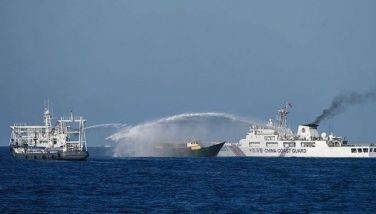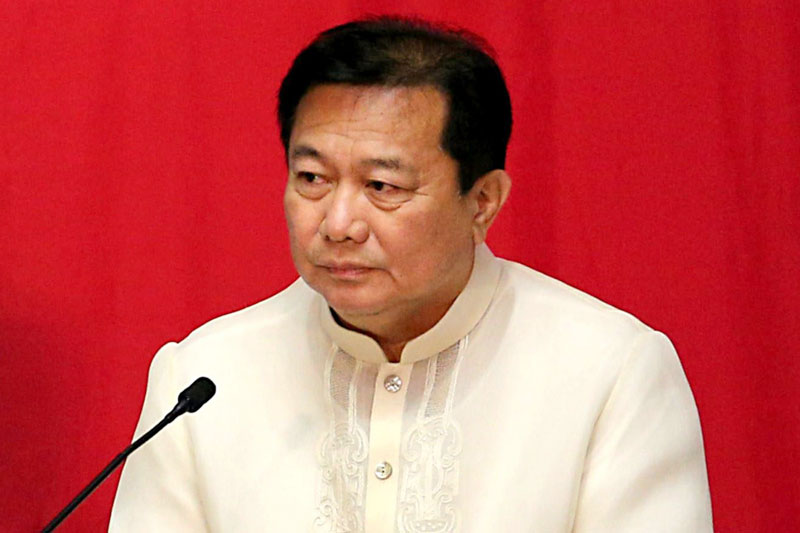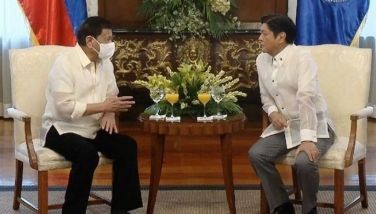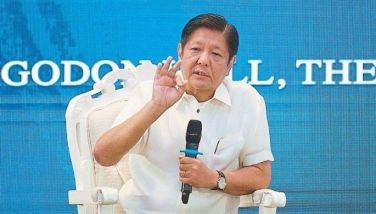Reformists growl tough stance for Asean tiger’s next reform era
CITIES OF TANAUAN, IMUS and MANILA, Philippines (The Filipino Connection) – The timing of a regular “procession” of drug pushers and users in the streets of a city’s public market is riding in the wave of new means to further reform a developing nation. The latest parade in Tanauan City, on a hot June 19 morning, bore bamboo arch-carrying security forces walking with arrested suspects; their arches carried a printed inscription: “June bride and groom (flavor of the month).”
These parades will continue, re-elected Tanauan City Mayor Antonio Halili pronounced after taking his oath.
The parade is a serious stunt by a local government that had shown a tough face to a long-running tag as the capital for drug dealing and murder in the province of Batangas (Tanauan City is some 66 kms. south of the Philippine capital Manila). That place is typical of the Philippines, if newly-sworn President Rodrigo Duterte is to be believed. (As for Halili, he fears the fleeing of investors and entrepreneurs as illegal narcotics agents –spread out in the city– spook on his local economy’s aspirations while continuing their trade.)
Halili just won a referendum for such bold action and was sworn June 30th, the same with the tough-talking Duterte from Davao City. Halili won by a mile, 49,206 votes, over his closest pursuer in last May’s elections; Duterte’s lead over his closest pursuer was over-6 million votes.
Halili is meeker compared to the 16th president since the second-term mayor speaks softly. But he sports a nearly Elvis Presley-like hair, and Halili even grooved with his public singing prowess —“Sometimes when we touch” by Dan Hill— during a campaign sortie.
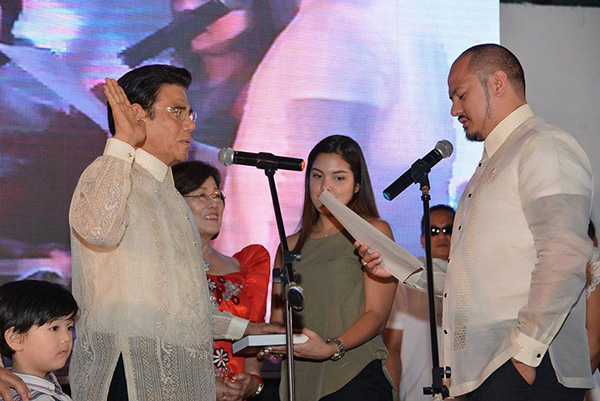
Tanauan City’s own "punisher," second-term Mayor Antonio Halili, also took his oath Thursday. Like newly-sworn Rodrigo Duterte, curbing criminality through unorthodox means is Halili’s continuing crusade. Facebook/Tanauan City’s Hope
But these two city mayors have let their public policy actions, albeit controversial to some, do the talking. The walk of shame of drug users and pushers and other criminals is a “new way” of confronting the locality’s drug menace. Traditional ways of solving the problem aren’t effective, the mayor says.
And Duterte? “Allow us a (style of) governance that is consistent with our mandate. The fight will be relentless and will be sustained. I know the limits of the power of authority of the president, what is legal and what is not. My adherence to due process and rule of law is uncompromising.”
These confrontations with neighboring danger have drawn Filipino voters. Locally, Halili will remain on the prowl to sustain such “experiment.” Duterte as the new president has the chance to growl out loud his model of security for development, Davao City, as a national benchmark.
These measures and these few tough Filipino leaders engulf their influence to a booming economy whose voters further want reform. The tough talking’s a come-on for today’s voting generation some 30 years after democracy was restored from martial rule.
Determined
Both Halili and Duterte do not want martial law. They just want to get things done for a citizenry impatient with pervasive fraudulence and corruption, both visible barriers to Filipinos’ dreams to live simply and abundantly.
And if the Philippines’s most recent president, Benigno Aquino III, had Daang Matuwid (straight path) for a governance slogan, Duterte differs just a little bit. With a stingy voice, Duterte said during a previous presidential debate, “Corruption must stop.”
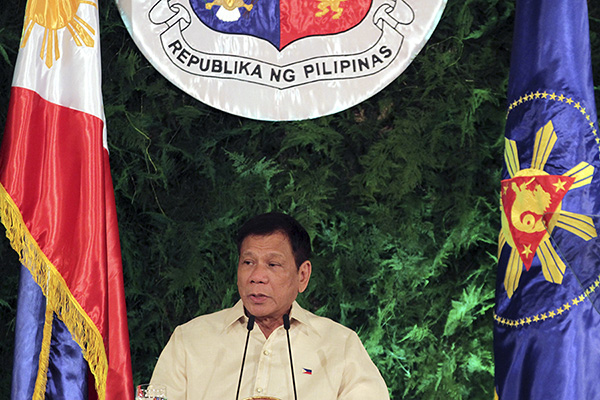
In this photo provided by the News and Information Bureau, Malacañang Palace, new Philippine President Rodrigo Duterte delivers his inaugural speech after taking his oath at his inauguration ceremony in Malacañang Palace Thursday, June 30, 2016 in Manila, Philippines. Duterte becomes the 16th President of the Philippine Republic. The News and Information Bureau, Malacañang Palace via AP
Whether jokingly or seriously, killing the corrupt, the drug agent and the criminal —especially when they try to fend off arrest with violence— is Duterte’s policy. “Read between the lines,” he told the nation today.
One can read it days ahead of today’s inaugural: On June 22nd, in Gen. Trias, Cavite province, a regional police director –Valfrie Tabian– ordered a buy-bust operation that killed five drug suspects who reportedly fought police operatives. Similar anti-drug operations and their victims and apprehended suspects swarmed police advisories across the country.
But these are not the only reforms the fresh Duterte presidency aspires for. His appointed Cabinet secretaries or ministers have a laundry list of reform packages: End labor contractualization. Recast the national agrarian reform program. Bolster the slumping agricultural sector. Cut off law enforcers and public officials conspiring for selfish interests. Speed up government frontline services. There’s a lot more.
The Aquino presidency and political career that both ended today basked in reforms to, say, the civil service, public budgeting that targets identified local needs, to even Filipino political culture by removing his face and name in tarpaulins of infrastructure projects. In various fronts covering Aquino’s social contract with the Filipino people (poverty alleviation, peace and security, to name a few), there are hits and misses though, say academics from the University of the Philippines’ Center for Integrative and Development Studies in an assessment of Aquino’s performance.
Deciphering
Reviewing presidents’ successes and shortcomings is typical during the changing of the guard. Waning satisfaction to the outgoing president had been seen since the 1986 People Power Revolution, notes Dr. Jean Franco of UP’s political science program. But Aquino ends with the highest satisfaction rating compared to previous presidents in local surveys.
Curiously, the Duterte personality warrants a deeper look; his Cabinet appointees —from various sectors and ideological leanings— baffled observers. His tough talking against criminals, drug dealers and corruption agents rattled civil servants and law enforcers. Shadow peace talks between insurgent groups and Duterte aides surprised non-Duterte voters.
Duterte is like a Godfather, Dr. Filomeno Sta. Ana III of the Action for Economic Reforms (AER) says in his deciphering of the character of this new head of state. The Godfather is novelist Mario Puzo’s obra that became a film of the same title, with Italian lead character Vito “Don” Corleone heading a New York City crime family. Corleone’s outside the legal system but sees its flaws and cracks.
Duterte’s “inside that government system” even if he’s a long-time local chief executive. Like Corleone, Sta. Ana notes, Duterte may think like the Godfather: given an unreliable system, “there’s no other kind of justice. Even police aren’t trustworthy so Duterte created his own force to bring back order —just like the approach of the Godfather.”
Attackers of Duterte’s style continue to be on the prowl. But one has to have time to understand Duterte carefully, Sta. Ana advises. The new President’s recent actions can also be likened to what the father of modern political science, Niccolo Machiavelli did, but “not in a negative sense.” (Machiavelli is known to employ clever tricks to get things done.) So this Mindanaoan “plurality” president who emerged from a divisive automated election may succeed in bringing people from various spectra, Franco said.
Deducing
Duterte’s inaugural speech had said it all: “I was not elected to serve the interests of any one person, or any group or any one class. I serve every one and not only one.”
That message is for the citizens of one of the world’s leading macro-economies, by gross domestic product. The Philippines is enjoying seven years of steady growth after the 2008 global economic crisis, with six of these years being Aquino’s pride. Those steady GDP growth rates happened “with the minimum of reforms” Aquino achieved, Sta. Ana observes.
But the potential under Duterte “is more than that. We could even attain seven or eight percent GDP,” Sta. Ana said.
“Just don’t screw it up, Digong.”
Anti-corruption as a serious presidential mandate, with some gains during Aquino’s term, is now Duterte’s call. But even under the graft-busting Aquino, international surveys on people’s perceptions on corruption, like that of Transparency International, did not make a dent to see that problem visibly reduced.
That reflected distrust with government, and this is a serious matter for Duterte. “Erosion of faith and trust in government: that is the real problem that confronts us. I see the erosion of the people’s trust in our country’s leaders; the erosion of faith in our judicial system; the erosion of confidence in the capacity of our public servants to make the people’s lives better, safer and healthier.”
For which, the new president said (in Cebuano), “must show real change (tinud-anay nga kabag-uhan).” Because this Southeast Asian democracy’s reform efforts’ impacts are still a long way to go, economist Sta. Ana and political scientist Franco both tell voters who want instantaneous change. Both political economy analysts remind that the Philippines remains a young democracy.
Drive
Even in Tanauan City where those parades of criminals occur, Mayor Halili acknowledges attacking the root of drugs and criminality: poverty. So the parades will prevail if only to erase Halili’s fears of local economic hardship.
Which is why the May 9, 2016 election results accommodated Duterte who now shapes the reform discussions, “not by breaking the system, but in fact trying to point at its ills,” Sta. Ana tells The Filipino Connection. “Democratic transition is very long. Our republic is still very young. It’s messy but reforms and transitions are messy, unavoidable but hopefully helpful.”
Look at the desire to improve Filipinos’ lot, if the messages of the survey titled AmBisyon Natin2040 (National Survey on the Aspirations of the Filipino People) by the National Economic and Development Authority (NEDA) are to be believed. If the Philippines wants to be a higher-income country by 2040 (with over-US$11,000 per capita income), this vision “can be realized with the right policies and programs.”
A pre-requisite to such aspiration, says NEDA, is support and commitment from the next four administrations, Duterte’s included. Note though that many aspirations —poverty and hunger eradicated, more quality local jobs generated, corruption eliminated, and peace and security ensured— are not all achievable immediately and simultaneously. And the seven-year macro-economic growth streak, or even Tanauan City’s flourishing business activity? The momentum from these developments must be sustained, NEDA reminds.
Doing reforms
Duterte, at 71 revealing his swift impatience with crooks, himself acknowledges the long trek to reform. “This fight will be relentless and will be sustained.”
So for now, in Tanauan City and enjoying a fresh three-year mandate, Batangas’ “punisher” Halili vows to work double-time to parade the criminals and parade the city with infrastructure and economic projects. Tanauan City is in quite good stead: over-2,500 businesses, a day to process new business permits with registrants taking 2.5 steps, and PhP375.4 million in business and real property taxes for a city of 152,393 –with drug-related danger in tow. As to where the drug cells are, Halili says his city government knows these.
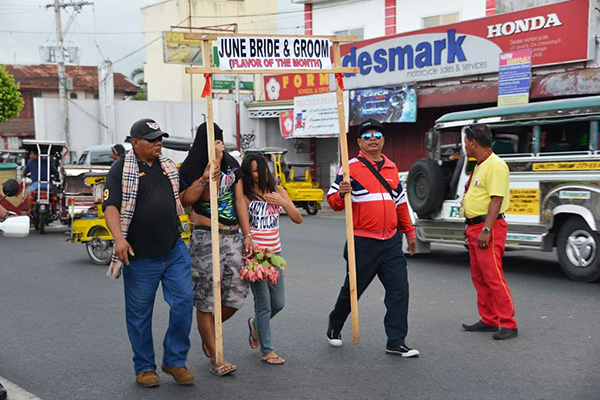
Arrested drug suspects in the Tanauan City government’s most recent “Walk of Shame” for arrested drug suspects. Halili says during his oath taking today today this practice will continue. President Duterte, for his part, says criminality must “be stopped by all means that the law allows.” Facebook/Tanauan City’s Hope
Rodrigo “The Punisher” Duterte, still young into the presidency, will have his day to know these drug operators and cells scattered across an expansive archipelago. Curbing the drug menace is one of the many battles his presidency will face.
“I sense a problem deeper and more serious than any of those (other problems) or all of them put together,” the president says. “But of course, it is not to say that we will ignore them because they have to be stopped by all means that the law allows.”
This tough stance, like how Duterte spoke to the nation for the first time as commander-in-chief June 30th, is the new face of Philippine reform –at least for six years. But the president called on Filipinos to do their own reform: “The change, if it is to be permanent and significant, must start with us and in us.”
***
Marlon Alexander S. Luistro is the editor and Jeremaiah M. Opiniano is the publisher of The Filipino Connection, a regional partner of Philstar.com
- Latest
- Trending

















